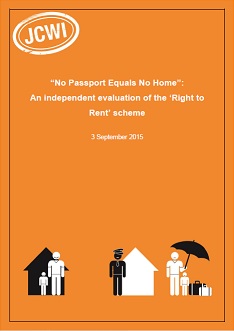JCWI's evaluation of the Immigration Act's Right to Rent scheme finds worrying direct and indirect impacts on tenants and landlords
A report by the Joint Council for the Welfare of Immigrants (JCWI) says the Right to Rent scheme, introduced by the Immigration Act 2014, has a number of negative impacts on tenants and landlords.
 The comprehensive 69-page report was released last week and can be read here.
The comprehensive 69-page report was released last week and can be read here.
The Right to Rent scheme was initially piloted in the West Midlands from 1st December 2014 to 1st May 2015 and the Government says it is set to be rolled out nationally.
Under the scheme, landlords and their agents have a duty to check the immigration status of potential tenants or lodgers before entering into a residential tenancy agreement with an individual. Renting to someone who does not have valid 'leave to remain' could lead to a fine of up to £3,000 per adult.
JCWI says its independent evaluation uncovered a number of worrying direct and indirect impacts of the Right to Rent checks on tenants and landlords, both in the West Midlands pilot area and across the UK as a whole.
The report's executive summary listed the following key findings:
a) 42% of landlords said that the Right to Rent requirements have made them less likely to consider someone who does not have a British passport. 27% are reluctant to engage with those with foreign accents or names. Checks are not being undertaken uniformly for all tenants, but are instead directed at individuals who appear 'foreign'.
b) 50% of respondents who had been refused a tenancy felt that discrimination was a factor in the landlord's decision. Further evidence of discrimination as a result of the Right to Rent checks has been received from organisations.
c) 65% of landlords are much less likely to consider tenants who cannot provide documents immediately.
d) 57% of landlords and agents nationwide and 40% in the pilot area feel they have not effectively understood the Right to Rent changes or remain unaware of them.
e) 65% of landlords have not read or feel they have not fully understood the 'Code of Practice on preventing illegal immigration' or the 'Code of Practice on Avoiding Discrimination'.
f) 56% of tenants in the 'pilot' area remain unaware of the Right to Rent scheme. 81% have not received any advice on how to prepare for the checks when applying for a tenancy or their rights in relation to the Equality Act 2010. Therefore tenants are therefore unable to properly safeguard against instances of discrimination.
g) 44% of tenants within the pilot area had not been asked for identity documents. This shows that the checks are not being undertaken by all landlords and agents in the 'pilot' areas.
h) Landlords and agents have charged fees in order to undertake the Right to Rent checks.
i) Unscrupulous landlords have passed the cost of a potential fine on to the tenant in the form of increased rent or deposits.
j) 69% of landlords do not feel that they should be made to undertake these checks. 77% are not in favour of a national roll out.
k) The Right to Rent checks are not deterring irregular migration nor are they preventing irregular migrants from accessing the private rental market.
Saira Grant, JCWI's Legal & Policy Director, said: "The findings from our independent evaluation show that the Right to Rent policy encourages discrimination and has created a hostile environment for all migrants and ethnic minorities in the UK seeking to access the private rental market. "
"Our evaluation shows direct discrimination by landlords against those legally here but with complicated or unclear immigration status. These checks are leading to increased racial profiling. Those who appear foreign or have foreign accents are finding it increasingly difficult to access tenancies."
While the Guardian reported last month that Housing Minister Brandon Lewis said the results of the Government's own evaluation of the Right to Rent pilot scheme would be published at the end of August, it has still yet to do so.
Saira Grant said the scheme must be properly evaluated and scrutinised by Parliament before any decision is taken on a national rollout.